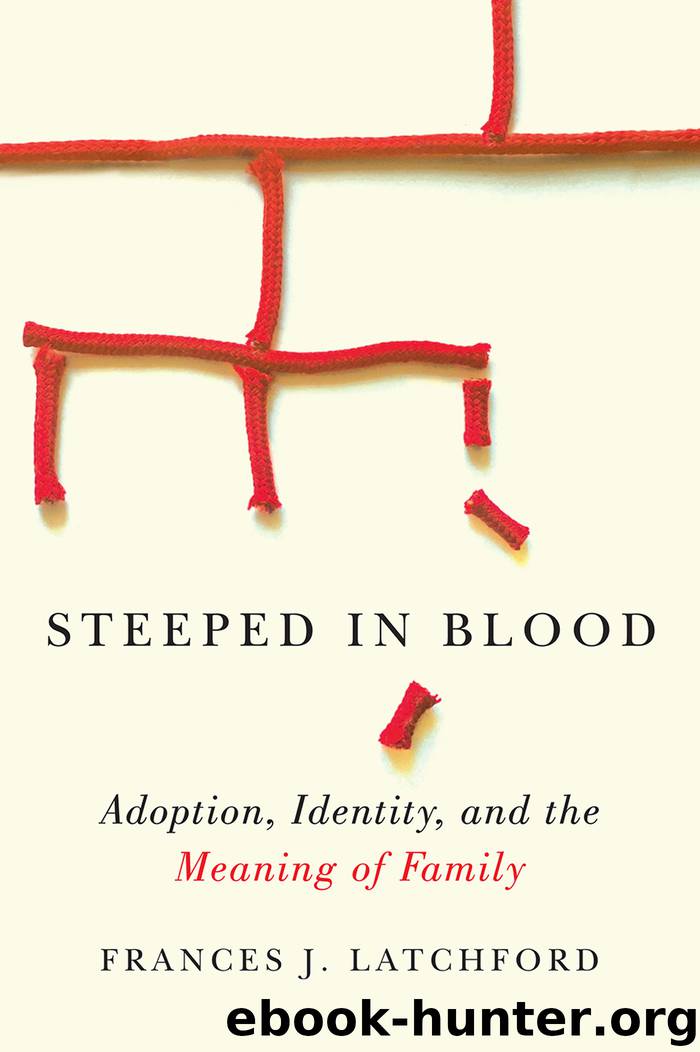Steeped in Blood by Frances J. Latchford

Author:Frances J. Latchford
Language: eng
Format: epub
Publisher: MQUP
Published: 2019-10-06T16:00:00+00:00
As it turns out, therefore, the child is not the only one subject to primary narcissism within the family context. To commandeer parental love, the child must, in fact, revive the parents’ primary narcissism.42 And the (biological) child is able to draw out the primary narcissism of his parents because it has already been set up by psychoanalysis as the universal original condition to which every self retains a repressed desire to return.
Psychoanalysis’s constitution of parental love in this way (re)inscribes a narcissistic turn toward biology as “family,” a turn that is already intrinsic to the modern Western bio-genealogical imperative. It further precludes the intelligibility of biological difference as a solid basis for “family” ties. This conclusion is evident in the idea that the child is loved only insofar as he is an external object who represents and replaces for the parent a version or part of the self that once was, and still is, loved. Parental love, therefore, is primarily derived from the parent’s ability to experience the child as an extension of the self. Given the logic of psychoanalysis, however, this experience is treated uncritically as one that is commensurate with being in the presence of genetic similarity. This idea is implied, for instance, in the way that psychoanalysis interprets the twin bond as it pertains even to a nurture perspective; the intensity of the twin bond occurs through each twin’s overidentification with the other insofar as the environmental experience of the presence of their genetic similarity convinces each that he is more like his twin than any other human being. It is also evident in Freud’s discussion of maternal narcissism; motherhood, he explains, is a significant opportunity for a woman to pass through primary narcissism into (narcissistic) object-love.43 Mothers are granted this opportunity because “[i]n the child which they bear, a part of their own body confronts them like an extraneous object, to which, starting out from their narcissism, they can give complete object-love.”44 In effect, a child is loved because he is experienced as an extension or part of the mother, not as an object that is fully recognized as separate and distinct. Love originally reserved for the mother, now directed toward the child, becomes object-love only insofar as the mother initially experiences her child/object to be part of her (biological) body.45
Freud does discuss the mother’s love for her child apart from and prior to parents in general, but he still seems to indicate that there is little difference between the sexes as “parents.”46 For instance, as we have just seen, he clearly characterizes a mother’s love as a narcissistic object-choice and describes a parent’s love as “a narcissistic stigma in the case of object-choice” wherein that love “is nothing but the parents’ narcissism born again … transformed into object-love.”47 He also makes it clear that his discussion of parental love is addressed to fathers and mothers. Thus a father’s love, as much as a mother’s, is the result of a revival of primary narcissism to whatever degree the child reflects the father and/or the father as he wishes to be.
Download
This site does not store any files on its server. We only index and link to content provided by other sites. Please contact the content providers to delete copyright contents if any and email us, we'll remove relevant links or contents immediately.
The remains of the day by Kazuo Ishiguro(8965)
Tools of Titans by Timothy Ferriss(8360)
Giovanni's Room by James Baldwin(7316)
The Black Swan by Nassim Nicholas Taleb(7099)
Inner Engineering: A Yogi's Guide to Joy by Sadhguru(6784)
The Way of Zen by Alan W. Watts(6591)
Asking the Right Questions: A Guide to Critical Thinking by M. Neil Browne & Stuart M. Keeley(5751)
The Power of Now: A Guide to Spiritual Enlightenment by Eckhart Tolle(5743)
The Six Wives Of Henry VIII (WOMEN IN HISTORY) by Fraser Antonia(5493)
Astrophysics for People in a Hurry by Neil DeGrasse Tyson(5172)
Housekeeping by Marilynne Robinson(4434)
12 Rules for Life by Jordan B. Peterson(4298)
Double Down (Diary of a Wimpy Kid Book 11) by Jeff Kinney(4257)
The Ethical Slut by Janet W. Hardy(4240)
Skin in the Game by Nassim Nicholas Taleb(4232)
Ikigai by Héctor García & Francesc Miralles(4232)
The Art of Happiness by The Dalai Lama(4120)
Skin in the Game: Hidden Asymmetries in Daily Life by Nassim Nicholas Taleb(3986)
Walking by Henry David Thoreau(3950)
